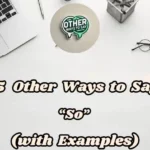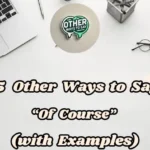The word “funny” is a common descriptor, yet it frequently falls short of capturing the specific type or intensity of humor you intend. How do you articulate something truly hilarious, describe a subtly witty remark, or convey genuine amusement without resorting to such a broad term?
This article delves into Other Ways to Say “Funny,” offering a rich vocabulary to express various shades of humor with greater precision and impact. Discover how to enhance your descriptions, ensuring your message conveys the exact comedic quality you envision.
What is the Synonym of Funny?
- Humorous
- Amusing
- Comical
- Hilarious
- Witty
- Entertaining
- Jocular
- Laughable
- Droll
- Whimsical
- Zany
- Lighthearted
- Playful
- Uproarious
- Side-splitting
1. Humorous
Humorous describes something that evokes laughter or amusement, often through cleverness or a light touch. It’s a versatile and slightly more formal word than “funny,” suitable for both casual conversations and professional settings like reviews or speeches. When you use humorous, you’re suggesting a refined, entertaining quality that’s broadly appealing, acknowledging wit or charm without being overly casual.
Usage Examples:
- Suppose your friend tells a clever joke at a party. You could say: “That was a truly humorous quip, you nailed it!”
- Imagine your colleague shares a witty slide during a presentation. You might say: “The humorous touch in your presentation really kept us engaged!”
2. Amusing
Amusing suggests something that causes mild laughter or gentle enjoyment. It often has a pleasant and approachable tone, perfect for casual or social contexts, such as everyday chats or social media posts. Using amusing emphasizes light, delightful entertainment that’s easy to appreciate, ideal for highlighting subtle, enjoyable humor.
Usage Examples:
- Suppose your sibling shares a quirky cat video. You could say: “That was an amusing clip, it really made my day!”
- Imagine your coworker tells a lighthearted office story. You might say: “What an amusing tale, it certainly cracked me up!”
3. Comical
Comical describes something that provokes laughter through absurdity, exaggeration, or often, visual silliness—like a slapstick scene or goofy behavior. It’s playful and informal, perfect for lighthearted moments among friends or family. When you describe something as comical, you’re highlighting exaggerated, often theatrical humor that’s instantly entertaining.
Usage Examples:
- Suppose your friend mimics a cartoon character at a gathering. You could say: “That was a comical impression, you’re absolutely hilarious!”
- Imagine your cousin trips dramatically but laughs it off. You might say: “What a comical fall, you totally owned it!”
4. Hilarious
Hilarious indicates something that causes intense, uncontrollable laughter. It’s a bold and energetic word, informal and enthusiastic, great for casual settings or when reacting to something that truly makes you burst out laughing, like a fantastic stand-up routine. Using hilarious emphasizes high-energy, gut-busting humor that’s memorable and infectious.
Usage Examples:
- Suppose your friend tells a wild party story. You could say: “That was a hilarious story, I’m still laughing about it!”
- Imagine your teammate shares a viral meme in a group chat. You might say: “That meme is absolutely hilarious, it’s too good!”
5. Witty
Witty describes clever, intelligent humor, often delivered through quick wordplay, sharp observations, or a clever comeback. It’s a sophisticated and charming adjective, ideal for conversations or writing that possesses a clever edge. When you call something witty, you’re praising smart, polished humor that impresses with its intellect and quick thinking.
Usage Examples:
- Suppose your sibling makes a clever pun at dinner. You could say: “That was a witty pun, you’re really on fire tonight!”
- Imagine your colleague delivers a sharp quip in a meeting. You might say: “What a witty remark, it truly stole the show!”
Related Post: 15 Other Ways to Say “Happy to Announce” (With Examples)
6. Entertaining
Entertainment suggests something that captivates and amuses, often through engaging or lively content, like a fun performance or an interesting story. It’s a versatile and positive word, great for social events, creative projects, or media. Using entertainment emphasizes enjoyable humor that holds attention and is part of a broader engaging experience.
Usage Examples:
- Suppose your friend performs a funny skit at a talent show. You could say: “That was an entertaining act, you kept us glued to our seats!”
- Imagine your coworker suggests a fun team-building game. You might say: “That’s an entertaining idea, it sounds like it will be a blast!”
7. Jocular
Jocular indicates playful, lighthearted humor, often with a teasing or joking tone, like friendly banter among friends. It’s warm and informal, perfect for close relationships or casual group settings. When you describe someone or something as jocular, you’re highlighting a cheerful, sociable humor that helps foster connection and a comfortable atmosphere.
Usage Examples:
- Suppose your cousin playfully teases you at a family reunion. You could say: “That was a jocular jab, you got me good!”
- Imagine your teammate makes a playful comment in a chat. You might say: “A jocular quip like that really lightened the mood in the discussion!”
8. Laughable
Laughable suggests something that provokes laughter, often due to its sheer absurdity or irony, like a ridiculous mistake or a comically bad plan. It’s informal and can be slightly cheeky, great for casual or humorous critiques. When you call something laughable, you emphasize the humor found in the unexpected or silly, often with a playful edge that highlights amusing flaws or oddities.
Usage Examples:
- Suppose your friend misreads a sign in a truly hilarious way. You could say: “That was a laughable mix-up, absolutely epic!”
- Imagine your colleague makes a funny typo in an email. You might say: “What a laughable error, it definitely gave us a chuckle!”
9. Droll
Droll suggests subtle, quirky humor delivered with a dry or understated tone, like a deadpan joke or an odd, yet insightful, observation. It’s a sophisticated and often niche form of humor, ideal for intellectual or witty company. Using droll highlights a unique, offbeat humor that’s quietly amusing, often surprising listeners with its cleverness.
Usage Examples:
- Suppose your sibling makes a dry, understated joke at a party. You could say: “That was a droll comment, it totally caught me off guard!”
- Imagine your coworker shares a subtle quip in a meeting that only a few people catch. You might say: “A truly droll remark, it was absolutely perfect for the moment!”
10. Whimsical
Whimsical describes something playful, fanciful, or quirky, often with a light, imaginative, or even magical tone, like a peculiar story or a charming design. It’s a charming and creative word, perfect for artistic expressions or casual contexts. When you use whimsical, you emphasize a delightful, imaginative humor that feels enchanting and often brings a smile.
Usage Examples:
- Suppose your friend designs a quirky, elaborate costume. You could say: “That’s such a whimsical outfit, it’s so much fun to look at!”
- Imagine your colleague creates a playful advertisement. You might say: “What a whimsical concept, it’s super catchy and memorable!”
Related Post: 15 Other Ways to Say “Happy to Hear That” (With Examples)
11. Zany
Zany conveys wild, eccentric humor, often characterized by high energy, absurdity, or clownish antics. It’s a bold and informal word, great for lively, casual settings with friends where anything goes. When you describe something as zany, you’re highlighting outrageous, unpredictable humor that’s full of boundless energy and often involves crazy pranks or behavior.
Usage Examples:
- Suppose your cousin does an incredibly wild dance at a party. You could say: “Those were zany moves, you totally stole the spotlight!”
- Imagine your teammate pulls a funny, elaborate prank in the office. You might say: “That was a zany stunt, it had us all laughing for hours!”
12. Lighthearted
Lighthearted describes humor that’s carefree, cheerful, and uplifting, often deliberately avoiding heavy or serious tones. It implies humor that’s easygoing and refreshing. It’s a warm and approachable word, ideal for social or family settings where the goal is simply to enjoy and uplift spirits. When you describe something as lighthearted, you emphasize a joyful, easygoing humor that makes everyone feel good.
Usage Examples:
- Suppose your friend shares a fun, positive anecdote at a gathering. You could say: “That was a lighthearted story, it genuinely made us all smile!”
- Imagine your coworker suggests a fun icebreaker before a team meeting. You might say: “What a lighthearted idea, it really set a great tone for our discussion!”
13. Playful
Playful conveys humor that’s teasing, fun, or mischievously spirited, often with a youthful or innocent tone, like a silly joke among friends. It’s informal and engaging, perfect for close friends or casual groups where interactions are relaxed and interactive. When you describe humor as playful, you highlight a fun, relational dynamic that fosters connection and camaraderie.
Usage Examples:
- Suppose your sibling teases you with a silly, endearing nickname. You could say: “That was a playful jab, you always manage to get me laughing!”
- Imagine your colleague makes a fun, good-natured remark in a chat. You might say: “A playful comment like that really brightened the day for everyone!”
14. Uproarious
Uproarious suggests humor that leads to loud, boisterous, and often communal laughter, typically from wildly humorous situations like a fantastic comedy show. It’s an energetic and informal word, great for describing big, shared laughs in social settings. When you call something uproarious, you emphasize intense, contagious humor that creates a lively and highly enjoyable atmosphere.
Usage Examples:
- Suppose your friend tells a wild joke at a barbecue that has everyone roaring. You could say: “That was an uproarious punchline, we’re all still in stitches!”
- Imagine your teammate shares a hilariously funny video in a meeting. You might say: “That was an uproarious clip, it got everyone going and lightened the mood!”
15. Side-splitting
Side-splitting describes humor so incredibly intense it feels physically overwhelming, leaving you gasping for breath from laughter. It’s an informal and vivid adjective, ideal for casual settings with big, memorable laughs. When you call something side-splitting, you emphasize gut-busting, exceptionally funny humor that’s hard to top and creates a truly impactful comedic experience.
Usage Examples:
- Suppose your cousin recounts a hilarious mishap from their vacation. You could say: “That was a side-splitting story, I literally can’t stop laughing!”
- Imagine your colleague shares a particularly brilliant comedy sketch. You might say: “What a side-splitting scene, that sketch is pure gold!”
Conclusion
That simple “funny” often fails to capture the unique essence of a comedic moment. Our journey through other ways to say “Funny” has provided you with a nuanced vocabulary, enabling you to articulate various shades of humor with precision and flair.
Avoid underselling truly hilarious moments. Instead, empower your language to truly reflect the joy and wit you experience. To master even more expressive communication, delve into the extensive resources on the Other Ways To Say homepage.

Thomas Schneider is a language enthusiast and expert in synonyms, dedicated to exploring the beauty of words and their nuanced meanings. With a passion for linguistics and clear communication, Thomas helps readers enrich their vocabulary and understand the subtle art of word choice. Whether you’re a writer, student, or language lover, his insights offer practical tools to elevate your language skills.


